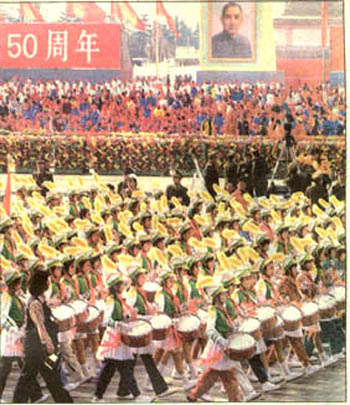 |
International Affairs
What's Old and New in Communism?
Atila Sinke Guimarães
An internal document for members of the Chinese Communist Party regarding its position on religion was leaked to Asia News Service, an important news agency based in Rome. The document was issued in November by the Communist Party’s Department of Propaganda and Asia News reported it in early December. I transcribe it from The Tablet (December 11, 2004, p. 33).
The document laments the “Westernizing” and “disintegrating” influence of religious faith and cautions officials to patiently and meticulously work to move the Chinese people away from religious beliefs. It is especially concerned about the growing interest in religion among the young and educated. According to the document, “fatuity – weakness or imbecility of mind – and superstitions” must be eliminated and replaced with “scientific thinking.”
An education in the “natural sciences” is vital so that the people will have “the basic knowledge about life, the rule of human evolution, and correctly deal with various natural phenomena, birth, ageing, disease, and death,” it instructed. Integrating Marxism more fully into the educational system is another focus, and the paper reiterates the party’s absolute monopoly over education. Marxism must permeate all activities in the lives of the population, “directing people’s cultural and sports activities, satisfying people’s spiritual and cultural demands, and popularizing knowledge on laws, rules and regulations,” so as “to change old habits into new ones.”

Celebrating the 50th anniversary of Communism in China -
the same Mao Tse Tung style of parades
Los Angeles Times, October 1, 1999 |
This document provides us a clear picture of the internal orientation Communism is following in China. An orientation, one should note, not so different from that of the China of Mao-Tse-Tung, which considered religion “the opium of the people.” The emergence of this document provides a good opportunity to show the naivety of the Western man who believe that Chinese Communism has changed.
Unfortunately, based on this supposed change, the West is pouring hundreds of billion of dollars a year into this regime, and also is allowing thousands of Chinese immigrants to enter our countries. The labor force of communist China, increasingly utilized by Western businesses to provide cheaper products (and fill their pockets with money), has a reverse side: we are becoming dependent on this work force. Tomorrow, China can blackmail us by shutting off its labor force. We would face a difficult choice: either we experience a collapse in our industry and commerce or we cave in and do whatever the communist Chinese leaders might demand from us.
This “shrewdness” of Western businessmen to turn a quick profit is slowly but steadily making a considerable part of the Western economy dependent on an undependable communist China. In the long run, the maneuver does not appear shrewd at all. More likely, it results from a foolish naiveté, reminding me of that famous communist prediction that the West would give communist countries the rope they would use to hang us. Actually, it is the same old communist plan taking advantage of new allies: Western businessmen.

Posted January 7, 2005
|
International Affairs | Hot Topics | Home | Books | CDs | Search | Contact Us | Donate

© 2002- Tradition in Action, Inc. All Rights
Reserved
|
 |
|